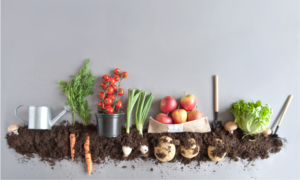Gardening has numerous advantages. At the surface level, a vegetable garden will provide you with sustenance. But as you delve deeper, you’ll learn patience as you gently care for something that needs tenderness. Your daily stress will also melt away during this soothing activity.

If you’re thinking of starting a garden, we recommend planting a vegetable garden. Here are the tips we find the most beneficial to getting your garden up and running. Remember, gardening requires time and care. The more work you put into the garden, the lovelier and more bountiful it will be.
7 Quick Tips on Vegetable Gardening for Beginners
Location-Based Tips
Plant in the sun
Whereas some flowers don’t need a sunny location, vegetables are a bit different. Most vegetables need at least six hours of direct sunlight. In general, the more sun your plants receive, the more plentiful your harvest will be.
Plant in nutrient-rich soil
Your veggies won’t grow if they’re planted in dry, lifeless soil. You’ll want to use a soft and enriched soil so that the roots can penetrate the ground more quickly. Determine the pH level of your soil—most plants thrive in a pH level of six or seven, as that environment will be richer in nutrients.
Pick a stable environment
Don’t plant your veggies in an area of your yard that floods every time it rains or that dries out quickly when it’s hot. Find a moderate place in your yard—one that doesn’t experience flooding, drying out, or strong winds.
Draw out your garden
The most common mistake for beginners is digging and planting blindly. Before digging, determine where you’ll plant each vegetable, and do your research on how much space you should leave for each.
Planting Tips
Start small
Don’t expand too quickly. The best thing you can do for your first garden is to start small. Understanding how to take care of just a few plants at a time will be better for you in the long run. Beginners’ gardens tend to be about 16×10 feet—this will leave you with plenty of room to feed your family through the summer.
Plant high-quality seeds
You may be tempted to buy cheap seeds as a beginner—and if you want to be discouraged, that’s a good way to do it. As a beginner, you should purchase high-quality seeds that will inevitably produce a better harvest. Plus, on the off chance that something goes wrong, you’re less likely to lose your entire crop of vegetables.
Use a trellis
One of the best things you can do for your garden is to utilize the space all around it. Don’t just plant in rows—plant upward, too. Trellising is the most common way to use garden space, as it allows you to grow upward, not just outward. Trellises help gardeners not only by providing more space, but also by supporting the plants as they grow.






